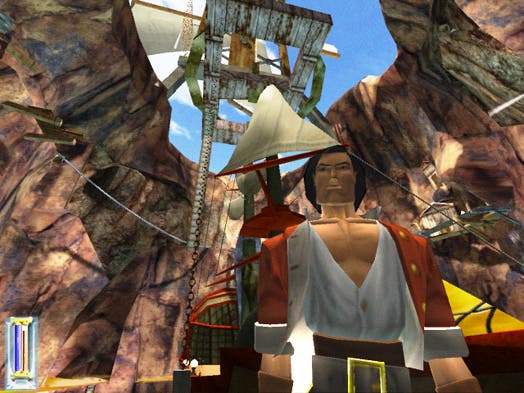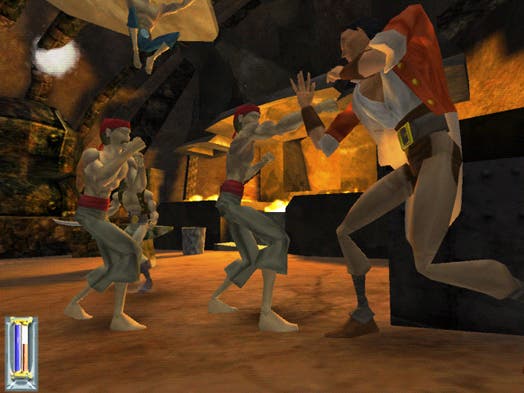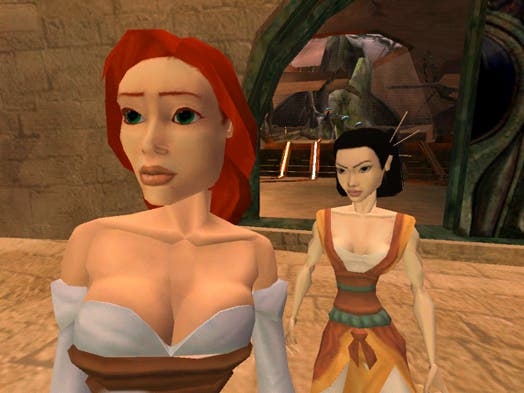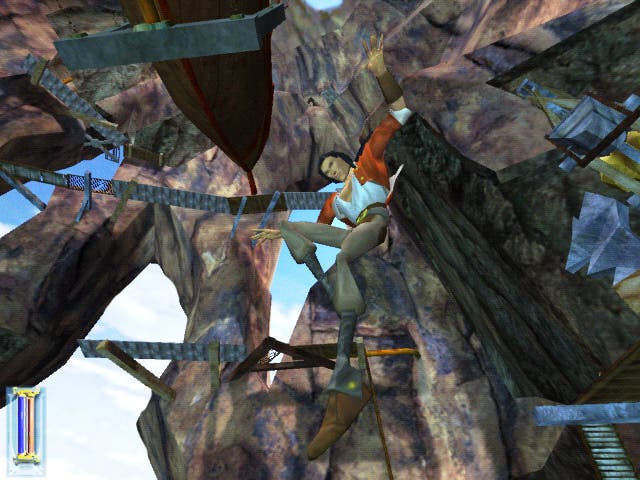Galleon
After seven years in development, this is what the man behind Tomb Raider did next...
Order yours now from Simply Games.
Quoting the original September 1999 press blurb, it's hard not to crack a smile: "Anticipated for release in spring 2000, Galleon promises to be the ultimate in 3D-adventure gaming." Back in the days when we were looking forward to the Dreamcast, and Galleon was still a PC-only game, Toby Gard's new creation offered "fluid, realistic movement and ultra responsive gameplay". In fact, at E3 2000, we saw the game for our own eyes for the first and only time, and admired the intuitive control system that clambered over obstacles with ease and yet allowed us to negotiate tiny planks in mid-air without crashing to our doom. It was clearly an ambitious game with a unique next-generation visual style, and having enjoyed the original Tomb Raider immensely we marked this down as one to watch.
Little did we know the game would take longer than any other to develop. Over seven years from its original genesis, only now are we finally in a position to sum up its merits - and on a platform that didn't even exist in the UK until the game had been in production for five years. But times move on. Not only is it not commercially viable to release this game on the PC anymore, but a planned GameCube version has also fallen by the wayside, while even the publishing duties have changed hands along the way.
Land lubbers

With a tiny-sized team expected to pull the whole project together it's a wonder they didn't just throw the towel in, especially when you factor in the issue of the incredible amount of time it took to make. Seven years is enough for a quantum leap in the world of games, and we genuinely wondered how Galleon could possibly have kept up with the Joneses after all these years. The truth is, had Galleon emerged blinking into the summer sunshine four years ago as planned, it would have been a blockbuster for Interplay, with its innovative controls, Disney-esque sheen and vast, cunningly-designed levels. Any normal franchise would have been into its third incarnation by now, and the logical progression from all the feedback would have long since ironed out the glitches inherent in this resolutely ambitious project. It's kind of pointless and frustrating speculating on what Confounding Factor should have done, because the average punter confronted with Galleon in the games store will know nothing of its history. The truth is Galleon is a good game, but not the great one it deserved to be, and most of its issues have nothing to do with not being at the cutting edge anymore. But more of that later.
Galleon, like Tomb Raider, is unashamedly an action-adventure. Like Lara's first adventure back in 1996, the sense of scale is one of the first things that hits you, and the buccaneering lead character Captain Rhama has an even more improbable level of athleticism that allows him to perform incredible leaps, scale sheer rock faces with his bare hands and fall uninjured from great heights. Like the ultimate lantern-jawed superhero, Rhama has all the British nobleman swagger and bare-chested machismo required for the job; he reeks of poise and manly grace - even with the skinniest legs in videogames. But despite having the proportions of a turkey being fattened for the slaughter, he also manages to be somewhat adept at unarmed combat, resembling a slightly hapless kung fu expert battling against the limitations of his limbs. His roundhouse kicks are a sight to behold, and such delightful comic touches run throughout the game.
Set in an unspecified piratical era, Rhama is essentially chasing after a nefarious type from island to island who has got his hands on a particularly powerful herb. The story's not essential to the game in any meaningful way, but it hangs together nicely all the same. In the main you're simply looking for a way out of whatever environment you find yourself in, and as such the game is split between the usual run, jump and climb exploration along with a dash of depressingly weak combat and the occasional ingenious puzzling. Each section is predictably divided up with some otherwise unrelated boss battle, and from that information alone, Galleon probably doesn't sound much different from any other action adventure you've ever got to grips with.
Out of control

One area that most definitely does set it apart is its control system, and one that's capable of swinging from the sublime to the ridiculous. The left stick controls both the camera and the movement, so imagine if you will a system whereby forward/back moves Rhama in the direction he's facing, while left and right steers the camera direction. It's not a system you'll immediately get along with, and for a time you'll be doing all manner of strange things like climbing on shelves while getting slightly annoyed with the fact that you can't look up or down. Even the interaction system is unusual, with Rhama forced to lock onto items of interest with the B button, with confirmation of your action often requiring a further upward nudge of the left stick. Combat is taken care of with the X and Y buttons, while the A button performs the requisite jump. Further to this, analogue movements dictate whether or not Rhama will fall off ledges or walkways, with a light press effectively guaranteeing your safety, while a full-on run is more dangerous but essential for performing insanely long jumps. In addition, the right trigger acts as both another combination in combat and Rhama's grab action when ascending rough rock, and all round it's a system that while not entirely to our liking certainly gives it a unique feel.
As much as we admire the different approach, and the intentions behind providing a system that reacts intelligently and dynamically to its environment, there are occasions all too often when the game allows you to pull off ludicrous actions and climb onto and into places you plainly don't have any business being. On a practical level, too, not being able to look down when you plainly need to (such as in the middle of a boss fight that requires you to jump onto an object then jump onto the boss's back) leaves you concluding that rather than sticking to a tried and trusted system Confounding Factor thought it could do better with its own. The fact is it's quite evidently not the better system, and for all its good intentions you can't help picking holes in it. Far from helping the gamer be more precise and alleviating frustration, it positively encourages your rage when your ability to progress is entirely held back by the controls.
Hand in hand with this all in one system is the less than perfect camera set-up, which, although it manages a decent job most of the time, has disastrous repercussions when it gets things wrong. Two examples spring to mind in this respect - whenever Rhama ascends rock faces the whole viewpoint lurches wildly to accommodate your new viewpoint, while a worse example is the disorientating pain of underwater navigation. The weakest point of the game, in fact, involves a time-based mission where you're swimming against currents and have to work out a route to the shore. This would have been fine were it not for the bizarre camera, which seems designed to completely disorientate you, compounded by the questionable decision to design a level that's in almost complete darkness.
Seven years... in t'bed

After seven years in development, you would assume that tedious elements such as the one mentioned above would have been comprehensively ironed out. Other moments also crop up to inspire reviewer's Tourettes, such as the end of level Tiger that takes about fifty hits to kill, yet can savage you not only in about two bites, but can pounce upon its prey in one frame of animation despite facing the opposite direction. Incredible. In fact, the combat in general is simply so basic and pointless that you can practically go through the entire game just stabbing X and the right trigger, with occasional use of the hard attack (Y button) when you're surrounded.
In short the combat just feels tacked on, and so inordinately basic and repetitive that you wonder why it was included at all. Meanwhile, the decision to make nearly every single boss monster roughly the same is an amazing decision, with players expected to climb up their foe's backs and stab/punch them in the head (with added stab them in the stomach additions later) every single time. Again, for a game in the works for such a long time, you'd think the combat might vary, but not so. The more you get into Galleon, the more you realise that apart from the curiosity to explore and find out what happens in the storyline, there's not actually a big incentive to keep going. For much of the time it's actually a very very frustrating game. It could even endanger your relationships - this reviewer got a severe dressing down at one point for bellowing profanity at a particularly frustrating element.
It's one of those games that were it not for the necessity to see it through for review purposes, you'd have gone and found something more entertaining to do, like go and sit outside in the sun and light a barbeque, watch the footy or just play a better game. Anything, rather than force yourself through some more really fundamentally badly designed levels. We simply wanted to ask the question to Confounding Factor on several occasions: Is this entertaining? For a portion of it, it most certainly is - once you figure out the control system - and the charm of the storyline helps, but midway through the game you're just left in such a worn out resentful state of mind that you wonder if you've been assigned some creative form of torture, as opposed to a relaxing form of digital entertainment by some of the finest design minds in the business.
Time waits for no man

Time hasn't been Galleon's friend from the top to the bottom. On a purely aesthetic level, Galleon set out to not just match the benchmark, but be the benchmark. You can still see the fruits of this noble goal in the marvellous lip-synching system which, although hand-drawn, manages to convey subtleties that few other games would ever attempt. Back in the early days of Galleon's development the team evidently decided to make the game a seamless experience, with cut-scenes integrated fully into the game engine at a time when everyone else relied on FMV - almost a totally unique approach at the time, but now par for the course. Nevertheless, you detect a degree of polish and subtlety lavished on the game that few bother with, and one of the game's core strengths is an array of convincingly animated, intelligently voiced cut-scenes, peppered with wry humour throughout. Every scene feel honed and finished, and such is the unique visual style its quality shines through.
The sad thing is, though, is that graphical techniques have moved on to such an extent that while Galleon undoubtedly lead the field for a long time, titles such as Prince Of Persia now outshine Confounding Factor's epic to such an extent that it's impossible not to come away with the feeling that the game simply looks slightly dated in several ways. Not in an ugly way, you understand, because in many respects it's still a beautiful-looking game with vast, sprawling levels of stunning scale and cunning design.
At no stage could you look at Galleon and feel that it was sloppily designed. The sheer craft that has gone into certain levels is impressive. Fall from the sky on the third level and you'll realise just how vertigo-inducing these levels can be as an hour's worth of your previous endeavours flash before your eyes before you crunch onto the deck in a sickening pile of twisted anatomy. Similarly, you get the sense that the animation couldn't be much better in a videogame - such is its stunning fluidity and craft. But once you factor how much texturing, bump mapping, lighting, particle and physics techniques have improved over the years it's impossible not to come to the depressing conclusion that time simply wasn't on Galleon's side. Three or four years ago, this would have been held up as an incredible achievement. The truth is that our expectations have risen, and others' technical achievements in the visual sense have long since usurped Confounding Factor's. While some of what's on show is still impressive, numerous other factors gang up against it.
Seven year itch
We were totally prepared to overlook the technical issues in Galleon and embraced the gameplay as if other games didn't exist. We dearly wanted to assess Toby Gard's labour of love on its own merits, and can safely say we enjoyed much of what went into Galleon, with its charming atmosphere, excellent script and totally unique visual style. Some of the puzzling, as well, adds brilliantly to the sense of adventure and exploration and if the game focused more on what it does best we'd have been talking in more glowing terms - perhaps even calling it the game that the last Broken Sword should have been, with supremely polished narrative adding much to the package.
But Confounding Factor believed it should have action in it too, and simply can't serve it up to the quality we've come to expect these days. The melee combat feels laboured, the boss fights repetitive and contrived, while the timed sequences largely frustrate to the point of desperate exasperation. Throw in the camera issues and the brave but ill-conceived control method and what you're left pondering over what might have been. Scratch that, what should have been. After seven years, we had every right to expect much more than a polished, competent, but ultimately flawed action-adventure.

